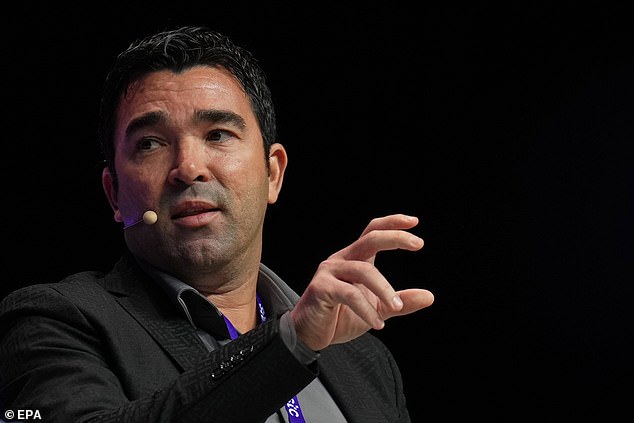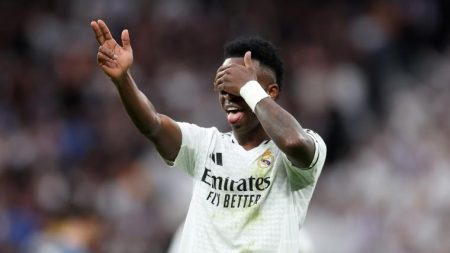Barcelona Sporting Director Deco’s Critique on Manchester City’s Spending
Barcelona sporting director Deco seemingly took a pointed jab at Manchester City over their significant January transfer splurge, which saw the club shell out around £180 million to bolster their underperforming squad. City’s signings included Omar Marmoush, Abdukodir Khusanov, Vitor Reis, and Nico Gonzalez, a move that has raised eyebrows across the football community. In an interview with Catalan station TV3, Deco acknowledged the financial disparity between the two clubs, emphasizing that Barcelona, currently grappling with financial constraints, cannot afford such lavish spending. However, he also suggested that his former club’s approach to building their squad has been more sustainable, stating, "They need a renewal [of the squad]. We’ve already done it. We signed three years ago, and the youngsters have established themselves." This comment not only highlights Barcelona’s financial limitations but also underscores the club’s focus on nurturing young talent and building for the long term.
Manchester City’s Financial Ambitions
Pep Guardiola, Manchester City’s manager, has been candid about the club’s financial position, noting that a positive net spend over the past five years has provided the flexibility to invest heavily now. Despite the club’s wealth, this splurge is a reaction to a season that has not met expectations. City is currently 15 points behind Liverpool in the Premier League and faced a shocking defeat to Real Madrid in the first leg of their Champions League play-off, losing 3-2 after leading 2-1. Guardiola has promised further significant changes in the summer transfer window, indicating that the club is prepared to continue their spending spree. This aggressive approach to squad building reflects City’s ambition to remain competitive at the highest level, even if it means weathering some criticism for their financial tactics.
Barcelona’s Financial Struggles
Barcelona’s financial woes have been well-documented in recent years, with the club often hitting the headlines for the wrong reasons. The Spanish giants have been constrained by stringent financial laws in LaLiga, which have forced them to make difficult decisions. One such decision was the controversial injunction that allowed them to re-register Dani Olmo, a £50 million signing, in January. This move was necessary to comply with LaLiga’s financial fair play regulations and to ensure the club could field their newly acquired talent. The financial crisis has also led to significant cuts in wages and a restructuring of the club’s spending habits. Despite these challenges, Barcelona remains committed to fielding a competitive team and is planning a more measured approach to squad reinforcement in the summer.
LaLiga’s Financial Regulations
LaLiga’s financial regulations are among the strictest in European football, designed to prevent clubs from overextending themselves financially. These laws have been a double-edged sword for Barcelona, providing necessary financial discipline but also limiting their ability to respond quickly to competitive pressures. The club’s financial fair play rules require clubs to balance their books and limit spending based on their revenue. This has forced Barcelona to be creative in their financial planning, including leveraging long-term partnerships, restructuring debt, and carefully managing their roster. The impact of these regulations is evident in the club’s cautious approach to transfers, which stands in stark contrast to the more liberal spending seen at clubs like Manchester City.
Barcelona’s Summer Transfer Plans
Despite the financial hurdles, Barcelona is not standing still. The club is looking to add a star player to their forward line and strengthen their full-back positions in the summer. Reports suggest that the focus will be on quality rather than quantity, with the aim of integrating new signings seamlessly into the existing squad. This strategy aligns with Deco’s comments about the club’s recent successes in nurturing young talent. Barcelona’s approach is to build a balanced team that can compete on multiple fronts, using a combination of experienced players and promising youngsters. The summer window will be crucial in determining how well the club can execute this plan and address their current weaknesses.
The Broader Context of Financial Fair Play
The situation at Barcelona and Manchester City highlights the broader debate around financial fair play (FFP) in football. While some argue that FFP regulations are necessary to maintain financial stability and prevent clubs from overspending, others contend that they can stifle investment and hamper a club’s ability to react to competitive challenges. Barcelona’s adherence to these rules has been both a strength and a weakness, forcing the club to prioritize long-term sustainability over short-term gains. Manchester City, on the other hand, has the financial backing to circumvent some of these limitations, allowing them to make bold moves in the transfer market. The contrasting approaches of these two clubs provide a fascinating case study in the balance between financial responsibility and sporting ambition in modern football.











